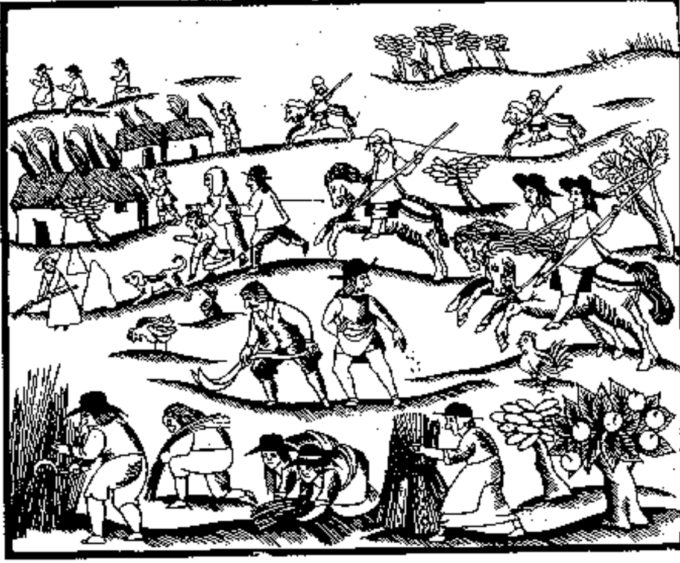
Bad luck on Friday the thirteenth, at least in 1650, because on that day, 13 January 1650, Abiezer Coppe was transferred from a prison in Warwick to one in Coventry and then some time later to London and Newgate prison. Coppe was imprisoned for “putting forth,” or publishing, A Fiery Flying Roll: A Word from the Lord to all the Great Ones of the Earth.
It was a revolutionary time. Less than a year earlier, 30 January 1649, the King, Charles I, was decapitated, and shortly thereafter Parliament replaced monarchy with a commonwealth. This put an end to the divine right of kings. At the same time the Levellers with their principle of political equality and the Diggers with their principle of commoning land were defeated. These defeats cleared the way forward for capitalist conditions of exploitation by the thorough separation of workers from the means of production, especially land. Slavery or prison became the future.
Coppe wrote, “Mine ears are filled brim full with cries of poor prisoners, Newgate, Ludgate cries (of late) are seldom out of mine ears. Those doleful cries, Bread, bread, bread for the Lord’s sake, pierce mine ears and heart, I can no longer forbear.”
Abiezer Coppe was a Warwickshire man, and a religious man, a Baptist. His thinking was based on his experiences with the murderous, impoverishing, disabling Civil Wars and on the Bible. He was called mad, insane, and a communist. I learned about him at the Centre for the Study of Social History at the University of Warwick (which is actually in Coventry) whose director, E.P. Thompson, historian of the working class, introduced the idea and practice of the ‘moral economy’ and one of whose associates, J.N. Neeson, had rejuvenated the history of the commons in England, Northamtonshire particularly.
The ’moral economy’ restricted profiteering at food markets, at least until the poor had a chance to buy bread. The commons by contrast had nothing to do at all with buying and selling. The commodity was its opposite. A subsistence customary right consisted of the ancient practice of gleaning which, one might think, was more closely related to the ‘moral economy’ than to the ’commons’ because by only taking what had been left behind after the grain had been harvested it appeared not to challenge landlords’ private property in the harvest.
Another member of Warwick’s Centre for the Study of Social History, David Morgan, had been an agricultural laborer for most of his adult life. He had observed gleaning as well as studied it, and therefore confidently wrote,
“During the period of gleaning the fields no longer belongs to the farmers but to the villagers. The law declared one thing, but the laboring poor went their way regardless…” He concluded that gleaning must be seen as a manifestation of the belief that common access to the soil was an enduring right.”
Three hundred years earlier Coppe described himself by the harvester’s tool, the sickle. His major theme – have all things common – can be realized because, quoting Paul, “God hath chosen BASE things, and things that are despised to confound – the things [that] are.“ Those who were despised in his time were (to use his terms) beggars, rogues, Gypsies, cripples, peasants, and ploughmen. He quoted James 5:6: “The wages you never paid to the men who mowed your fields are loud against you, and the outcry of the reapers has reached the Lord of Hosts.”
As far as Abiezer Coppe was concerned he actually spoke with and by and from and for “the Lord of Hosts.” In response to such an authority Parliament passed the Blasphemy Act as soon as they got him into prison. They mandated
“that all mayors, sheriffs and justices of the peace in the several counties, cities, and towns within this Commonwealth be required to seize all the said books … and cause the same to be forthwith burnt by the hand of the public Hangman.”
Coppe advocated neither “sword levelling” nor “digger levelling,” yet he prophesized how “the substantiality of levelling is coming.” So, against the great ones of the earth, he wrote
“Well! Do what you will or can, know you have been warned. It is not for nothing, that I the Lord with a strong wind cut off (as with a sickle) the fullest, fairest ears of corn this harvest, and drop’t them on purpose for the poor, who had as much right to them, as those that (impudently and wickedly, thievishly and hoggishly) stile themselves the owners of the Land.”
How do we scale up this kind of substantial levelling? Is it to be moral economy or commons? Shall we cause it with rogues, beggars, cripples, James, Paul, Romanies, and Others? Or, otherwise?
This content originally appeared on CounterPunch.org and was authored by Peter Linebaugh.